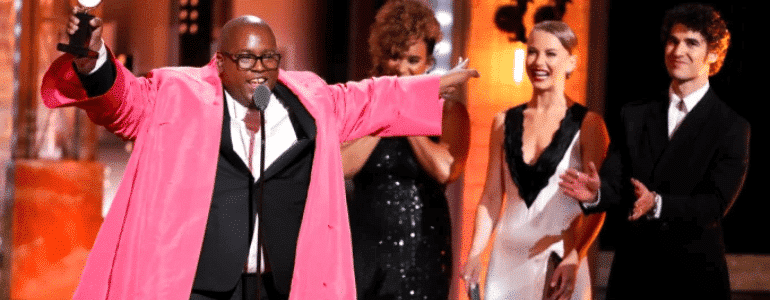Theater Things That Don’t Make Sense Vol. 11: Why pay once, when you can pay twice.
When I was producing Godspell, I bumped into a a quirky little union rule that didn’t make much sense to me, but cost my investors and me more than a few ‘cents.’ I was gonna blog about it then, but I figured it was a pretty rare situation. Since I didn’t think I’d slam up against it again anytime soon, I let it lie.
Flash forward two years later, and while budgeting Gettin’ The Band Back Together for Broadway, I’ve bumped back into it. And from what my GM tells me, it comes up on a whole bunch of Broadway shows.
So, I thought I’d clue you in, in case you face the same issue in the future.
Here’s what’s going down:
On a show where an actor plays an instrument, there is a bit of a jurisdictional battle over which union that “player” should belong to – the actors’ union or the musicians’ union. Sure, he’s an actor, and that’s his primary function. But, as the musician’s union justifiably argued years ago, that actor might be replacing the work of one of their members – and that’s the ultimate no-no when it comes to unions.
Honestly? The musician’s union has a point. In some cases, if that actor didn’t play that instrument, you might need another musician in the pit, right? And you probably auditioned looking for an actor that played that instrument in the first place. The musician’s union could be losing a job, and it’s their job to prevent that.
When this came to the bargaining table years ago, the first part of the decision was that the actor had to be paid the greater of his contractual actor salary, or the salary that he would have made as a musician. Example: if the actor’s contractual was $1,750 but the minimum musician salary for whatever he was playing was $1,875 . . . he’d get $1,875.
Ok, makes total sense. I’ve got no issue here. We shouldn’t get away with paying less for a specific type of work.
But here’s where it starts to get a little odd.
The actor is made to join the local musician’s union (and pay the initiation fee). Now, since a majority of them never expect to work in that union’s jurisdiction again, guess who a lot of agents ask to pay that fee? That’s right. The Producer.
Hmmm, not sure I like that part. But hold on, that’s not the big issue.
The producer is then required to pay benefits (health, pension, etc.) on behalf of that performer to the Actors Union . . . and the Musician’s union.
Yep. Both unions get paid.
One person. Double benefits.
Now remember, in most cases, that actor won’t work under the musician’s union again, which means they most likely won’t vest in the pension plan, and won’t need the health insurance (since they will most likely be covered under their actors’ union plan).
One person. Double benefits . . . and they won’t even use them.
And now you can probably see why, in 2013, this just doesn’t make sense to me. And this is one of those little things that drive Broadway Investors crazy.
Instead of all of the folks in on this battle coming to an equitable solution that didn’t add expense to the show (splitting benefits, a your-turn/my-turn rotation, etc.), the solution was to just make the Producers and Investors pay more than they should. And remember, this wasn’t even our jurisdictional issue! We just got saddled with the mediation bill . . . to the ‘tune’ of thousands of dollars per year.
You know, come to think of it, I’d be even more upset about this if I were the actor! Why? Think about it. If there is extra money being paid out, and the actor isn’t going to see a benefit, why not just pay the money straight to the actor??? They are the ones doing the extra work, right? That money could be going straight in their pocket! And they could invest it/bank it as they see fit!
(Now, let me make something clear. I’m not pointing a blamity-blame-blame finger at anyone for this idiosyncratic rule. These kinds of things get into agreements for a whole bunch of reasons, including tit-for-tat on other areas of the negotiation, precedents, etc. So no blame here – no evil anyone. We study history not to blame, but to learn, so as not to repeat.)
So what’s a Producer to do?
Well, you can choose to not have your actors play instruments. (That was something we considered greatly on Godspell where our actors weren’t replacing pit musicians at all. The artists came in playing instruments and we found a way to use that in the show.)
But then the show probably just wouldn’t be as good.
And so you pay. And that’s what is happening now, and that’s what I’ll be obligated to do on Gettin’ The Band Back Together (unless there is a collectively bargained change, which would probably mean us giving up something else somewhere else . . . sigh).
But we can’t do these kind of things forever. This is how budgets get bloated. Rules like this have to be more realistic, or we will have to start making decisions that will cause the shows to suffer.
And when the shows suffer, the audiences don’t come, and then there won’t be room for any benefit payments, never mind two.
(Got a comment? I love ‘em, so comment below! Email Subscribers, click here then scroll down to say what’s on your mind!)
_ _
FUN STUFF:
– Win the “Be a Broadway Star” board game. Click here to enter!
– Come to my 6th Annual Producer’s Perspective Social on 12/12! Click here to RSVP.
– Have you invested in a Broadway show? Take our Broadway Investor Survey by clicking here!
– Attend the How to Audition Workshop on 12/5. Only one participant spot and a few auditor spots are left! Click here to register.
Podcasting
Ken created one of the first Broadway podcasts, recording over 250 episodes over 7 years. It features interviews with A-listers in the theater about how they “made it”, including 2 Pulitzer Prize Winners, 7 Academy Award Winners and 76 Tony Award winners. Notable guests include Pasek & Paul, Kenny Leon, Lynn Ahrens and more.













